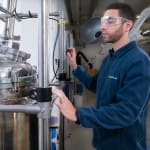
The increasing demand for sustainable solutions in the plastics industry has placed a spotlight on the challenges of recycling materials for food contact applications. Aimplas, the Plastics Technology Centre, is addressing these challenges through the Deconwaste project, which focuses on the research and development of innovative cleaning and decontamination methods for recycled polyolefins. Polyolefins, widely used in packaging, present unique recycling difficulties due to their diverse applications, the presence of various additives, and complex chemical behavior. These factors complicate decontamination and require advanced, specialized technologies to ensure safety for food contact use.
The Deconwaste project, funded by the Valencian Institute for Competitiveness and Innovation (IVACE+i) and the European Regional Development Fund (ERDF), aims to transform post-consumer polyolefin waste into safe, high-quality recycled materials. The project is guided by the stringent requirements of the European Food Safety Authority (EFSA), ensuring that the recycled plastics meet all necessary food safety standards. One of the main obstacles in recycling polyolefins is the difficulty in distinguishing between food and non-food packaging during the recycling process, as well as the challenge of tracing the origin of recycled materials. This complicates subsequent processing and increases the risk of contamination.
Adrián Morales, lead researcher in Mechanical Recycling at Aimplas, emphasizes the importance of developing new decontamination methods that can address these technical challenges. According to Morales, the initiative not only aims to comply with European regulations but also seeks to enhance consumer protection and trust in food packaging made from recycled materials. By improving decontamination processes, the project aspires to enable the safe reuse of recycled polyolefins in direct food contact applications, which has previously been a significant bottleneck in the industry.

Collaboration and industry impact
The success of the Deconwaste project relies on strategic collaboration with key industry partners. Companies such as Acteco, Spberner, and Picda are actively involved in validating the new technologies developed within the project. These organizations are committed to innovation and sustainability, and their participation ensures that the solutions are practical and applicable to real-world manufacturing processes. The project also aligns with the Sustainable Development Goals (SDGs), particularly goals 8 (decent work and economic growth), 9 (industry, innovation, and infrastructure), and 12 (responsible consumption and production).
For companies, especially small and medium-sized enterprises (SMEs), the advancements made through Deconwaste represent an opportunity to incorporate recycled materials into their production lines with confidence in their safety and traceability. This could lead to a broader adoption of recycled polyolefins in food packaging and other sensitive applications, supporting the transition to a more circular and sustainable plastics economy.
Advancing circular economy and compliance
The research conducted by Aimplas through the Deconwaste project is expected to help overcome one of the main barriers in polyolefin recycling. By enabling the use of materials that were previously discarded due to safety concerns, the project supports the manufacture of new packaging and products intended for direct food contact. This advancement is in line with European policies promoting a circular economy, environmental protection, and consumer safety.
Aimplas continues to demonstrate leadership in applying scientific and technological solutions to major sustainability challenges in the plastics sector. The outcomes of the Deconwaste project are anticipated to contribute significantly to the industry's ability to meet regulatory requirements while advancing environmental goals and fostering innovation.


